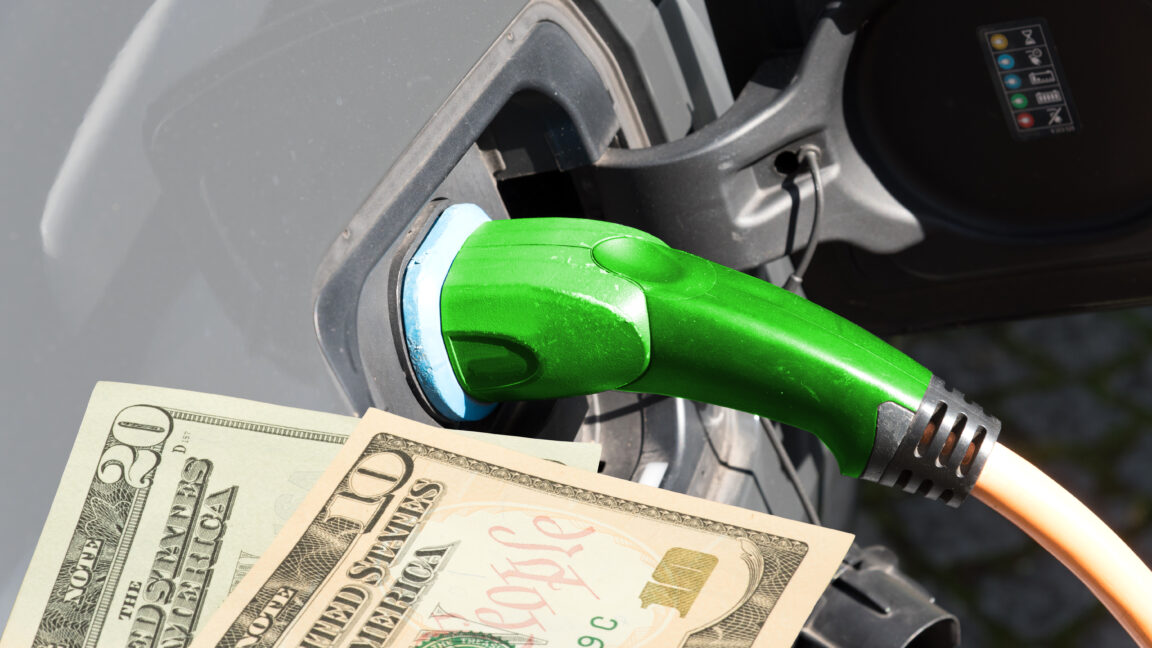
ARSTECHNICA.COM
Republicans want to tax EV drivers $200/year in new transport bill
smfh
Republicans want to tax EV drivers $200/year in new transport bill
Internal combustion engine drivers would pay only $20 a year, and only from 2030.
Jonathan M. Gitlin
–
Apr 30, 2025 9:08 am
|
65
Credit:
Getty Images
Credit:
Getty Images
Story text
Size
Small
Standard
Large
Width
*
Standard
Wide
Links
Standard
Orange
* Subscribers only
Learn more
WASHINGTON—Here in DC, the House Transportation and Infrastructure Committee will meet today to discuss its proposed budget legislation, and there's a doozy in there for drivers of electric vehicles and hybrids. As part of the Republican Party's ongoing war against science and the environment under President Trump, committee chairperson Sam Graves (R-Mo.) has included some new annual fees that will cost all drivers some, but some drivers more.
The Republicans plan to use the budget reconciliation process to pass this legislation, which is an expedited process that removes some of the US Senate's ability to stall. They're proposing a new annual federal motor vehicle registration fee, which state DMVs would have to collect and pass back to the federal government.
If it passes, all battery EVs would be subject to a new $200 tax. Hybrids—defined as a vehicle that is propelled by both an electric motor and an internal combustion engine or other power source (which would include fuel cell EVs)—will pay $100. But someone who commutes 90 miles a day in a particulate-belching Ford F-350 Duramax diesel pickup truck gets away with a mere $20 a year, and only from October 1, 2030; until then they get to drive for free.
To make things even better, the bill requires these fees to be linked to inflation and should be increased each year, until 2034 when the tax expires for unelectrified vehicles, or 2035, the last year that EVs and hybrids would be taxed like this. So a $200 registration fee in 2026 becomes a $250 registration fee in 2035.
Not everyone will have to pay, however. The bill exempts commercial vehicles, which should see a rush from tax avoiders to register their vehicles under their businesses, similar to what we saw during the George W. Bush administration, when a change in the tax law meant businesses could claim a $100,000 tax credit if they purchased a truck or SUV that weighed more than 6,000 lbs. Farm vehicles are also exempt from the law.
With EV adoption as low as it is in the US, the sums raised by these EV and hybrid charges will be essentially a rounding error in the federal budget, which this year should top $7 trillion. The Eno Center for Transportation calculates that this new tax will contribute an extra $110 billion to the highway Trust Fund by 2035 but that cuts to other taxes and more spending mean that the fund will still be $222 billion short of its commitments—assuming that this added fee doesn't further dampen EV adoption in the US, that is.
The committee cannot actually mandate that states collect these new taxes on drivers. But just as the federal government used the withholding of federal highway funds as a stick to force all states to raise the drinking age to 21, this bill would require the Department of Transportation to withhold 125 percent of the estimated total registration fees if it did not comply.
Rep Graves' justification for this regressive attack on clean energy policies is that it's merely a matter of fairness, with a healthy side helping of the usual grievance politics. "Our proposal more than offsets these historic investments and reduces the deficit with rescissions of wasteful Green New Deal style spending from the Inflation Reduction Act and ensuring that electric vehicles begin paying their share for their use of the nation’s highways. It’s only fair that EVs pay these user fees like other motorists. In fact, the new user fees provision addresses the broken Highway Trust Fund revenue stream in a substantial manner for the first time in over 30 years," Graves said in a statement.
Making this move even more regressive, Graves notes in his statement that the vast majority of US states—39 in total—already charge EV drivers a registration fee, and 28 do the same for hybrid drivers. Graves also hints at the end of a federal gasoline tax, despite ever-increasing levels of atmospheric CO2 and the unequivocal evidence that this is caused by fossil fuel emissions.
"House Republicans are threatening to take away billions of dollars in funding that will help to slash health-threatening pollution, improve walkability, and rebuild communities harmed by highways," said Katherine Garcia, director of Sierra Club Clean Transportation for All.
"They're also trying to punish EV and hybrid drivers with an excessive annual fee rather than fixing the unsustainable Highway Trust Fund. Now is the time to incentivize, not penalize, people to drive cleaner vehicles that curb pollution harmful to our health and climate. Rather than spreading misinformation and attacking popular programs, Congress must focus on ensuring more Americans have access to clean transportation options. This proposal to shift critical funding and impose a punitive fee on Americans to pay for billionaire tax cuts is unacceptable."
Jonathan M. Gitlin
Automotive Editor
Jonathan M. Gitlin
Automotive Editor
Jonathan is the Automotive Editor at Ars Technica. He has a BSc and PhD in Pharmacology. In 2014 he decided to indulge his lifelong passion for the car by leaving the National Human Genome Research Institute and launching Ars Technica's automotive coverage. He lives in Washington, DC.
65 Comments
0 Comments
0 Shares
33 Views


